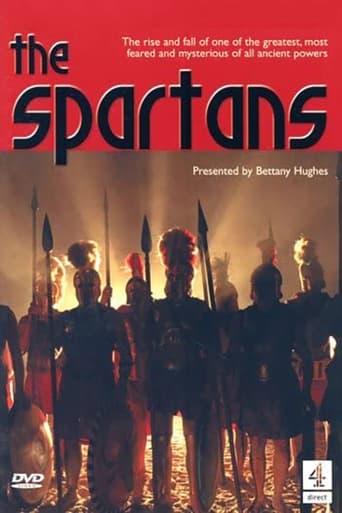MartinHafer
This is a superb mini-series about the lesser-known city state of Sparta. I say 'lesser-known' because most of the famous Greeks we think of (such as Plato) were from Sparta's rival city, Athens. This is because instead of founding the state on philosophy and democracy, Sparta was founded on toughness. To them, the highest achievements were from war and death in combat the way most folks wanted to leave this Earth. To put it in modern terms, Sparta was a nation of Klingons! I was thrilled to see this series because too often when we think of the ancient Greeks, we think of Athens or the unified Greeks under Alexander--yet, the Spartans were a HUGE force in the ancient world--a major regional power.The series is narrated by Bettany Hughes--a scholar who looks absolutely nothing like the stereotypical professor! This is not a complaint--just a comment on how beautiful and engaging she is here. In addition to her narration, there are lots of clips of various artifacts and visits to locations discussed in this three-part series. Overall, it's exceptionally well done, interesting and very, very thorough! Well worth seeing.
johnnieroderickbyrne
Oh The Spartans - that was the name of one of the programmes I saw.One reason "Why history matters to me" which I wouldn't have posted on the History Matters site was highlighted by Five Live, the radio station. So I blame them for initially reminding me of Bettany Hughes and sending me towards the History Matters site for a lot of futile activity trying to post my "One Day In History" - 17 October 2006. This is the era where you HAVE to find someone else to blame isn't it? I was listening to Simon Mayo interviewing Ray Winston I think when suddenly realised the guest had changed to some one feminine. Just as I learnt it was Bettany Hughes, historian, plugging the "One Day In History" exercise. Apropos nothing I had heard, she suddenly asked Simon to look at her top garment and tell her if he could see her breasts? Boy if I hadn't been sitting down already....! Anyway, Mr Mayo being the gallant gentleman he is demurred from undertaking the good Doctor's request for an examination. Me – I was off and running to get my stamp collectors magnifying glass (two bands of light helps with viewing thru it). I closely inspected my radio but am sad to report I couldn't see Ms Hughes top half. Sigh! Yes I can say in 3 words one of the reasons history matters to me. "Doctor Bettany Hughes". With the David Starkey's, Simon Sharma's and Peter Ackroyd's shoving themselves into camera shot on every occasion they can – mostly when history programmes are on (which my missus loves) I find something more urgent to do. Like watching paint dry in another room, which hasn't been re-decorated in a decade. But then I saw one of Doctor Hughes' historical programmes and was hooked. What a shallow person I am! I usually yell at the men presenters draping themselves all over my view of the pyramids, whatever. But ask me what subject each Bettany Hughes' programme was on, be it an hour or even two hours long and I would no doubt only mutter incoherently "Bettany! Bettany!" I am a disrespectful viewer with Peter Ackroyd – his shows on The Romantics and London were wonderful but his constant presence on the screen looking moodily off into the middle distance irritated the heck out of me.But I consider it a frame of film wasted if Dr Hughes isn't in it. Her head, just so, the sun glinting off that raven wings jet black hair. I go weak.Hey, someone move those damn pyramids out of the way! Are you ready for your close up, Dr Hughes?
wobelix
Some have the odd believe that history is boring.They must have missed this wonderful 3part documentary, now available on DVD thanks to PBS (available at every internet store, and nicely priced at the pleasant eBay store 'moviemarz'...).What a glamorous production ! No shortcuts here to bring the story to live. Beautiful crane shots and even helicopter shots are used to show ancient and nowadays Greece. Imagery is vivid and fresh, using pottery and museum artifacts as well as live action 'replays' and millennium old panorama's.Host and writer Bettany Hughes, a superb scholar and someone who has the gift to tell a story in such a way that it's true without ever growing stale, gives a splendid performance, finding the middle between a popular talk show host and an 'all knowing' professor.And the topic itself ? WOW !! The Spartans have inspired the Western world for 2500 years, in good (Plato, Aristotle, Herodotus, the French AND American Revolutionaries...) and very bad (Hitler) ways. Their lives and thinking are displayed here in an easygoing and exuberant way, which makes the 3x 55 minutes fly by. Did THE SPARTANS build their own Utopia ? And if they did, did they themselves turn it into a dystopia ? Watch this splendid documentary and find out !!!!!
